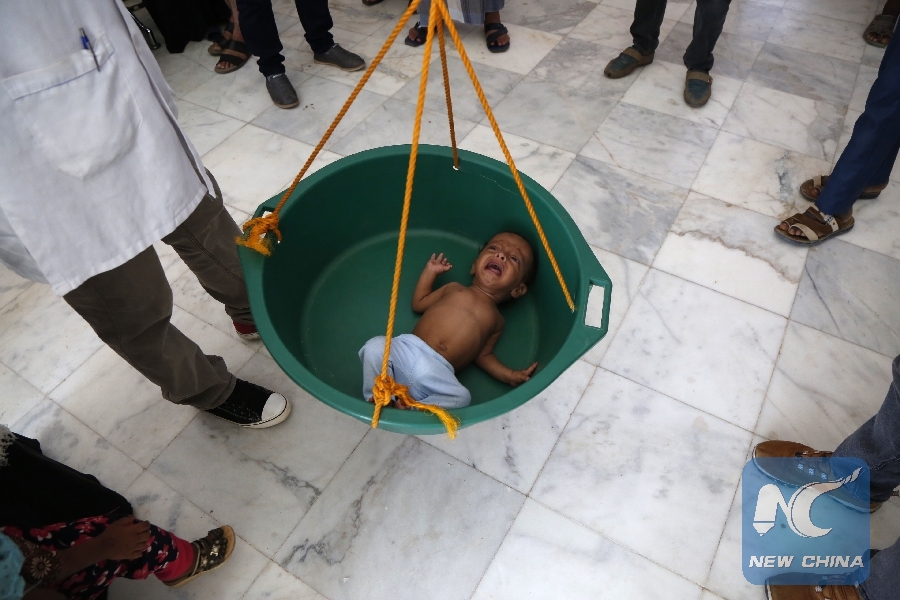
File Photo: A doctor checks a malnourished girl at a hospital in Hajjah province, Yemen, Oct. 1, 2018. (Xinhua/Mohammed Mohammed)
UNITED NATIONS, Dec. 14 (Xinhua) -- UN Under-Secretary-General for Humanitarian Affairs Mark Lowcock on Friday warned against complacency over the success of UN-brokered Yemen talks, saying "a terrible tragedy is unfolding" in the country.
"This week's success must not lead to complacency -- in fact it must do the opposite. Commitments must be implemented. Working toward peace must be accelerated. In the meantime, millions of Yemenis still desperately need assistance and protection," Lowcock told the Security Council, referring to progress in UN-brokered intra-Yemeni talks in Sweden.
After a week of "consultations" in Sweden, the Yemeni warring parties have agreed to stop fighting in the rebel-held port city of Hudaydah, on which millions of Yemenis depend for imports of food and fuel.
But Lowcock warned that there is a long way to go despite the success in Sweden.
"I have earlier today chaired another detailed discussion on Yemen with the heads of all the key UN and other operational humanitarian agencies. Our collective assessment is that the good news we have heard this week has not yet had any material impact on the millions of people who need assistance," he told the council. "The lesson is two-fold: progress is absolutely possible, but we need much more of it right now."
Lowcock, who visited Yemen recently, said the humanitarian situation in the country is getting worse.
"I can again confirm what humanitarian agencies have known for a long time: a terrible tragedy is unfolding in Yemen. And it is getting worse. Millions of people are starving, sick and desperate. They have one message for the world: this war needs to stop."
More than 20 million Yemenis -- two-thirds of the total population -- are food insecure, and 10 million of them are severely food insecure, more than twice the number before the war, he cited a recent comprehensive survey as showing.
The figures came from a consortium of agencies, which conducted a food security survey in 330 of Yemen's 333 districts, had the data analyzed and scrutinized by multiple organizations and reviewed by independent experts before the publication of their Integrated Phase Classification report last week.
More than half of the districts across Yemen have slipped into "emergency" conditions, nearly 60 percent more than last year, said Lowcock.
For the first time, the report documents "Phase 5" conditions in Yemen, which means extreme food gaps, very high malnutrition rates and excessive mortality, he said.
"The results decisively confirm Yemen's descent toward famine. Even for experienced aid workers, the numbers are shocking," he said.
The economic crisis is taking a heavy toll on the country's humanitarian situation. Yemenis' livelihoods and access to income have been decimated, and agricultural production has fallen by nearly a third. Food prices are 150 percent higher than they were before the crisis. These developments have left millions more Yemenis unable to afford food and other essential goods, said Lowcock.
He called for international efforts to buttress the Yemeni economy.
Foreign currency injections over the last two months from Saudi Arabia and the United Arab Emirates have been effective in stabilizing the exchange rate, financing imports of essential goods and paying pensions and civil servant salaries, he said.
The Yemeni rial is currently trading at just over 500 to the U.S. dollar, which represents a marked appreciation compared to a few weeks ago. But a dollar still costs more than twice as many rials as before the current conflict, said Lowcock.
Research indicates that the exchange rate needs to come down to about 440 to the dollar before it will have a wider impact on people's ability to afford food and other essential goods, he said.
To achieve this, and to finance imports, pay salaries and pensions, and meet minimum costs reliably, the Yemeni government is going to need billions of dollars in external support for its budget in 2019, he said.
Lowcock emphasized that the primary cause of the humanitarian crisis is the ongoing conflict. It is no coincidence that two-thirds of the people most at risk of starvation live in Hajjah, Hudaydah, Saada and Taizz -- the places where the violence has been most intense this year, he noted.
The agreement on Hudaydah reached in Sweden offers hopes for a real cessation of hostilities, he said. "As the details (of the agreement) are being worked out, we continue to call for a full cessation of hostilities across the country."
"Up to now, we have only seen a reduction in fighting in some areas -- not a full cessation. In the last week, nearly 450 conflict incidents were reported across Yemen, about a third of them in Hudaydah."
Yemen has been in civil war in the past three-plus years, pitting Houthi rebels and forces loyal to the government of Abdrabbuh Mansur Hadi. Saudi Arabia leads a military coalition to support the Hadi government.

